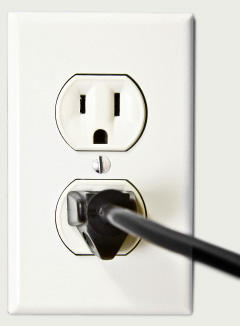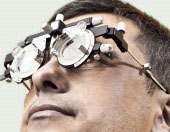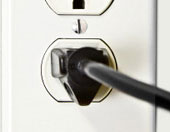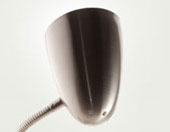Home energy saving tips: mini quiz
Posted in Home Health & Safety on June 24, 2013. Last modified on April 29, 2019. Read disclaimer.

Did you know that anywhere from 5-30% of the energy used in your home is going to waste? This means that as much as $660 a year is flying right out the window! Since everyone in the home is an energy user -- parents, kids, even the pets -- conservation has to be a COOPERATIVE effort. Make it a family project and stay ahead of rising energy costs.
Where is all of our home's energy going?
According to the 2009 Residential Energy Consumption Survey, the average US household's energy use goes toward:
- Furnace and space heaters: 43%
- Appliances, electronics and lighting: 30%
- Water heater: 18%
- Air Conditioning: 8%
- Refrigerators: 5%
+ Free Shipping & Returns on Eligible Items.
(*Amazon's Top 100 list updated hourly.)
Take this test to see how energy resourceful your family is:
HEATING AND A/C
We save up to $150/year because we have a programmable thermostat.
We set back our thermostat when we go to work and before we go to sleep and save 2% for every degree over a span of 8 hours. However, we avoid drastic changes in temperature settings.
We keep our furnace operating efficiently by keeping furniture and obstructions away from radiators and heating registers.
We don't waste our money by heating rooms we're not using. We close the door and shut off radiators and heat vents.
We don't keep the door open unnecessarily when we say goodbye to our friends or let the pets out.
We close the damper tightly whenever our fireplace is not being used because this prevents warm air from being drawn out of the house.
We have sealed off all the common places where heated or air conditioned air leaks into and out of our home, such as electrical receptacles, mail slots, around pipes and wall or window-mounted air conditioners, attic doors, window frames and inadequate door weather stripping.
We add storm windows and doors or plastic over windows and doors for better insulation.
We save gas during the summer months by turning off our furnace pilot light.
We use free heat from the sun to warm our house and close shades and drapes at night to keep the heat in.
We know that north windows are energy losers and keep shades and drapes pulled all winter on those windows.
We run ceiling fans and portable fans when running the A/C isn't absolutely necessary.
We keep our house cool by keeping shades pulled and windows and doors closed during the hottest part of the day.
We use our air conditioner sparingly if at all, and then only to cool the rooms we are using.
We operate our air conditioner efficiently by putting it in a window out of direct sunlight and keeping the filter clean.
We avoid using the oven on hot days and cook outdoors frequently to avoid heating up the house.
We have inspected our ductwork for adequate insulation and leaks, making repairs as needed.
LIGHTING
We lower our electric bills by turning off all unnecessary lights and using only enough lighting to get the job done.
We save 50%-75% of energy spent on lighting through by using LED and CFL bulbs rather than old-fashioned incandescents. (Plus, our CFL and LED bulbs last 10 times longer before they need replacing.)
We keep lamps and fixtures clean since dirt can significantly reduce light output.
LAUNDRY
We save money by keeping our water heater thermostat on the low setting.
We save by washing full toads in the clothes washer
We use cold or warm settings when washing clothes.
We dry full loads of clothes, one after another, so the dryer doesn't cool between loads.
We keep our dryer operating efficiently by cleaning the tint screen and exhaust vent before every use.
We hang clothes outside to dry, whenever the weather permits.
BATH
We use bathroom and kitchen exhaust fans sparingly so valuable heat is not drawn out of our home needlessly.
We save water by taking quick showers, using low-flow showerheads and turning off the water when lathering up.
We use low-flow toilets, since toilets are the biggest consumers of water in the house.
APPLIANCES
We keep freezers and refrigerators away from heat sources like the dishwasher, stove and sunny windows.
We have disconnected all unnecessary appliances like extra refrigerators and freezers.
We keep our refrigerator running efficiently by regularly cleaning the cooling coils.
We turn off computers, TVs, printer, DVD player and even laptop and cell phone chargers when they are not in use.
We replace inefficient appliances with ENERGY STAR rated units as needed.
We cook with the microwave as much as possible, since it uses 80% less energy than does a conventional stove.
We insulated the pipes on our hot water heater.
KITCHEN
We cover foods when placing them in the refrigerator because liquids in uncovered foods make the fridge work harder.
We always use cold water in the disposal.
We never let water run constantly when doing dishes, brushing our teeth or washing hands.
We wait until we have full loads before running the automatic dishwasher.
We let our dishes air dry for free by turning off the dishwasher before the drying cycle begins (and cutting the amount of energy the dishwasher uses in half).
So, how did you do?
- 15 or more items, you are a "Resourceful Family." Keep it up and discover even more ways to conserve.
- 10-14 checked means that you are on your way to highest energy savings - but be a little more resourceful.
- 5-10 items means you're passing up lots of FREE opportunities to save on your energy bills.
- Less than 5? Buy stock in your utility company now!
For even more ways to reduce your energy bills, see the Home Energy Savings Daily and Periodic Checklist
For tips on conducting your own "home energy audit", visit http://energy.gov/energysaver/articles/do-it-yourself-home-energy-audits. Otherwise, consider hiring a professional energy auditor (or home energy technician) to request a comprehensive energy checkup. This covers everything from outdoor leaks, attic insulation, furnace and water heater efficiency and condition, ductwork seals, lighting and even a blower door test using an infrared, thermographic camera.
Sources:
• Test Your Energy Use Habits flyer, North Carolina Cooperative Extension Service, Buncombe County Center
• 10 Easy Ways to Save Energy in Your Home, International Association of Certified Home Inspectors

 Support for care givers
Support for care givers What's better: Organic, local or conventional produce?
What's better: Organic, local or conventional produce? What causes flatulence?
What causes flatulence? Prostate cancer symptoms and risk factors
Prostate cancer symptoms and risk factors Early detection of eye diseases
Early detection of eye diseases Reduce stress with a gratitude journal
Reduce stress with a gratitude journal Home energy savings checklist
Home energy savings checklist Quick tips for cutting your utility bills
Quick tips for cutting your utility bills